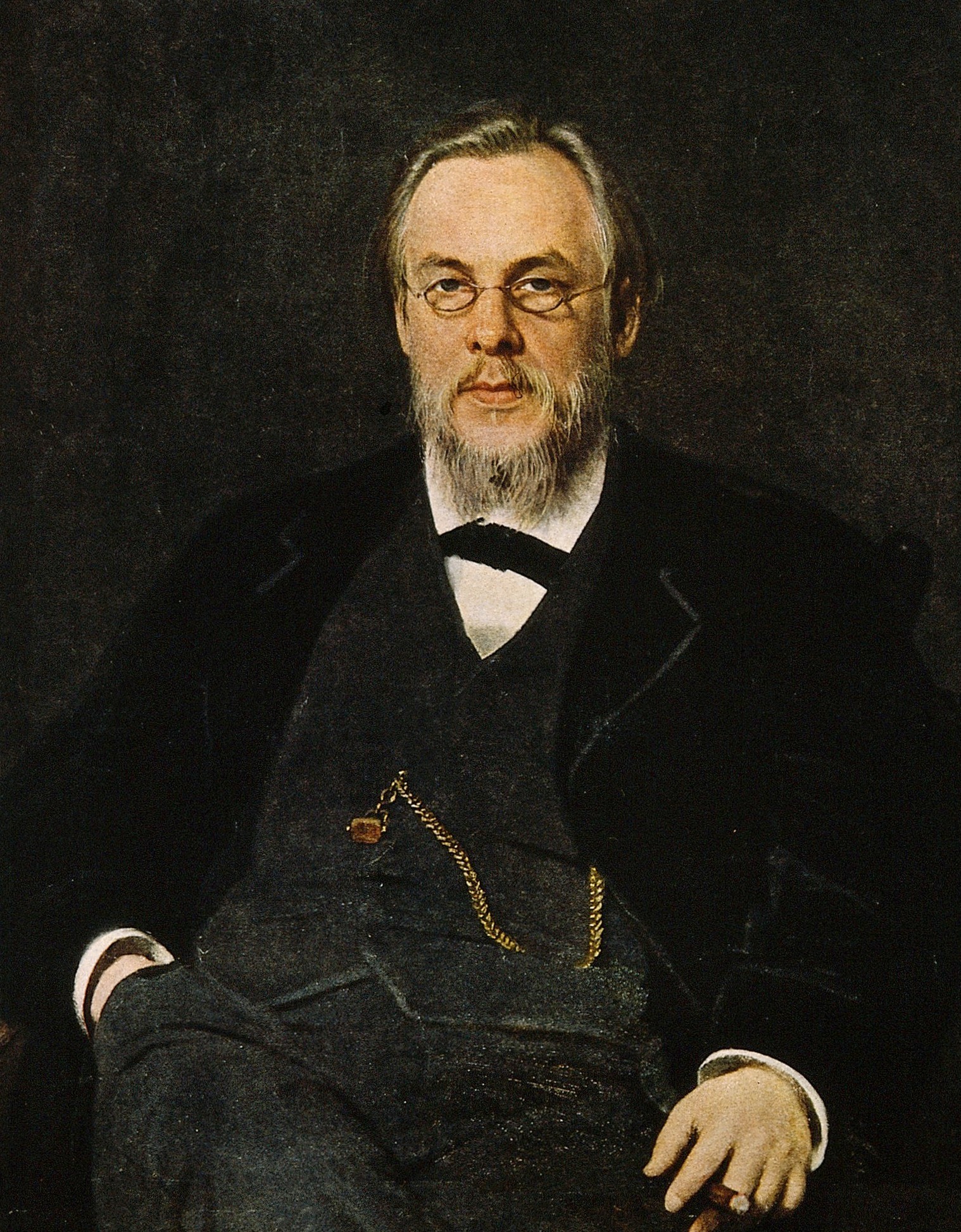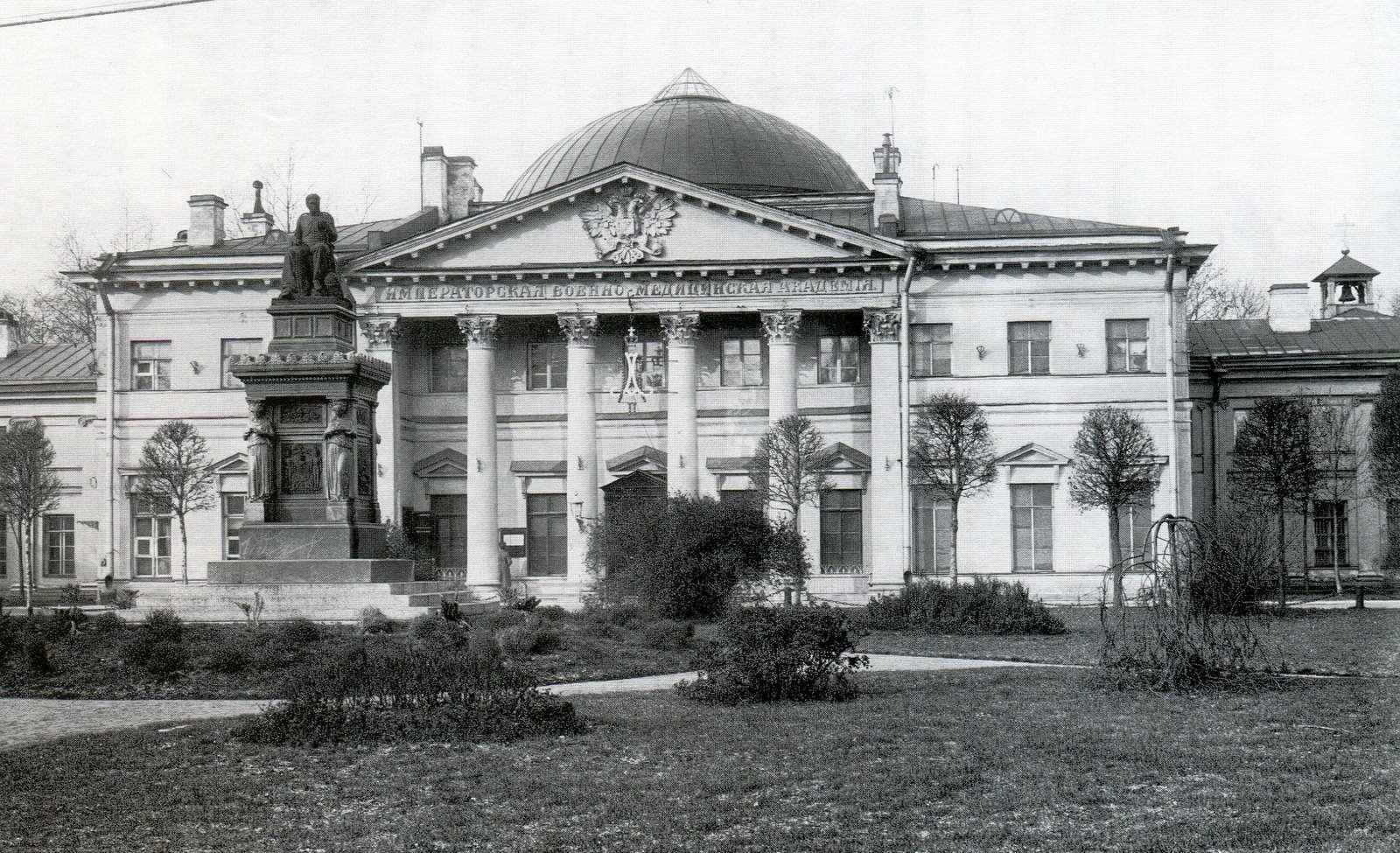|
Ivan Pavlov
Ivan Petrovich Pavlov (, ; 27 February 1936) was a Russian and Soviet experimental neurologist and physiologist known for his discovery of classical conditioning through his experiments with dogs. Pavlov also conducted significant research on the physiology of digestion, for which he was awarded the Nobel Prize in Physiology or Medicine in 1904. Education and early life Pavlov was born the first of ten children, in Ryazan, Russian Empire. His father, Peter Dmitrievich Pavlov (1823–1899), was a village Russian Orthodox priest. His mother, Varvara Ivanovna Uspenskaya (1826–1890), was a homemaker. As a child, Pavlov willingly participated in house duties such as doing the dishes and taking care of his siblings. He loved to garden, ride his bicycle, row, swim, and play gorodki; he devoted his summer vacations to these activities. Although able to read by the age of seven, Pavlov did not begin formal schooling until he was 11 years old, due to serious injuries he had sustained ... [...More Info...] [...Related Items...] OR: [Wikipedia] [Google] [Baidu] |
Classical Conditioning
Classical conditioning (also respondent conditioning and Pavlovian conditioning) is a behavioral procedure in which a biologically potent Stimulus (physiology), stimulus (e.g. food, a puff of air on the eye, a potential rival) is paired with a neutral stimulus (e.g. the sound of a Triangle (musical instrument), musical triangle). The term ''classical conditioning'' refers to the process of an automatic, conditioned response that is paired with a specific stimulus. It is essentially equivalent to a signal. The Russian physiology, physiologist Ivan Pavlov studied classical conditioning with detailed experiments with dogs, and published the experimental results in 1897. In the study of digestion, Pavlov observed that the experimental dogs salivated when fed red meat. Pavlovian conditioning is distinct from operant conditioning (instrumental conditioning), through which the strength of a voluntary behavior is modified, either by reinforcement or by Punishment (psychology), punishment ... [...More Info...] [...Related Items...] OR: [Wikipedia] [Google] [Baidu] |
Ryazan
Ryazan (, ; also Riazan) is the largest types of inhabited localities in Russia, city and administrative center of Ryazan Oblast, Russia. The city is located on the banks of the Oka River in Central Russia, southeast of Moscow. As of the 2010 Census, Ryazan had a population of 524,927, making it the List of cities and towns in Russia by population, 33rd most populated city in Russia, and the fourth most populated in Central Federal District, Central Russia after Moscow, Voronezh, and Yaroslavl.An older city, now known as Old Ryazan (), was located east of modern-day Ryazan during the late Middle Ages, and served as capital of the Principality of Ryazan up until the Mongol invasion of Kievan Rus', Mongol invasion in 1237. During the Siege of Ryazan, it became one of the first cities in Russia to be besieged and completely razed to the ground. The capital was subsequently moved to Pereyaslavl-Ryazansky (), and later renamed to Ryazan by order of Catherine the Great in 1778. The c ... [...More Info...] [...Related Items...] OR: [Wikipedia] [Google] [Baidu] |
Physiologist
Physiology (; ) is the scientific study of functions and mechanisms in a living system. As a subdiscipline of biology, physiology focuses on how organisms, organ systems, individual organs, cells, and biomolecules carry out chemical and physical functions in a living system. According to the classes of organisms, the field can be divided into medical physiology, animal physiology, plant physiology, cell physiology, and comparative physiology. Central to physiological functioning are biophysical and biochemical processes, homeostatic control mechanisms, and communication between cells. ''Physiological state'' is the condition of normal function. In contrast, '' pathological state'' refers to abnormal conditions, including human diseases. The Nobel Prize in Physiology or Medicine is awarded by the Royal Swedish Academy of Sciences for exceptional scientific achievements in physiology related to the field of medicine. Foundations Because physiology focuses on the ... [...More Info...] [...Related Items...] OR: [Wikipedia] [Google] [Baidu] |
Sergey Botkin
Sergey Petrovich Botkin (; 5 September 1832 – 12 December 1889) was a Russian clinician, therapist, and activist, one of the founders of modern Russian medical science and education. He introduced triage, pathological anatomy, and post mortem diagnostics into Russian medical practice. Life and career Botkin was born on 5 September 1832, in Moscow to a family of famous Russian tea tradesmen, and the son of Anna Ivanovna (Postnikova) and Petr Kononovich Botkin. He made his first steps towards education in the private school of Ennes. In 1850 Botkin was admitted to Moscow State University. In 1855 Sergey Botkin graduated from the university with honors and received a Doctor of Medicine degree. Shortly afterwards however he was mobilized as a conscript, designated to serve as military surgeon and sent straight to Sevastopol, where the Crimean War was in full swing. There Botkin worked under the guidance of Nikolay Pirogov, widely recognized as a pioneer of field surgery (i.e. ... [...More Info...] [...Related Items...] OR: [Wikipedia] [Google] [Baidu] |
Elias Von Cyon
Elias von Cyon, also known in French as Elie de Cyon (born Ilya Faddeyevich Tsion; ; – 5 November 1912), was a Russian and French physiologist. He was born to Jewish parents in Telšiai in the Russian Empire (now in Lithuania). His father was a Cantonist. Biography Son of Pinkhos (Faddey) Cyon and his wife Sarah; he had an elder brother Moses (born 1840).Frank Fox, "The Protocols of the Elders of Zion and the Shadowy world of Elie de Cyon," ''East European Jewish Affairs'', 27:1 (1997), 3-22. . Paywall. Cyon studied medicine at the medical-surgical academy in Warsaw, at the University of Kiev and in Berlin. He obtained a degree in medicine in Kiev in 1864. In 1866, he worked in Leipzig as an assistant to Carl Ludwig (1816–1895), with whom he collaborated on creation of the first isolated perfused frog heart preparation. From 1867, he taught classes on anatomy and physiology at the University of St. Petersburg, where he was assistant to the director of the physiology ... [...More Info...] [...Related Items...] OR: [Wikipedia] [Google] [Baidu] |
Imperial Academy Of Medical Surgery
The S. M. Kirov Military Medical Academy () is a higher education institution of military medicine in Saint Petersburg and the Russian Federation. Senior medical staff are trained for the Russian Armed Forces and conduct research in military medical services. History Origins The origins of the academy go back to the years of Peter the Great. In 1715, by the Tsar's order the Admiralty Hospital in the Vyborg Side of Saint Petersburg was founded. In 1717 next to it the Land Military Hospital was opened. Since 1773 surgical schools attached to both hospitals were operating. In 1786, those schools were consolidated into the Main Medical College. It became the principal training center for army and fleet physicians. Imperial Medical and Surgical Academy Unofficially, the year 1714 is considered the foundation year of the academy. The Medical and Surgical Academy was established by the order of Emperor Paul I of 18/29 December 1798 on the initiative of Baron Alexei Vasilyev ( ru ... [...More Info...] [...Related Items...] OR: [Wikipedia] [Google] [Baidu] |
Obituary Notices Of Fellows Of The Royal Society
The ''Biographical Memoirs of Fellows of the Royal Society'' is an academic journal on the history of science published annually by the Royal Society. It publishes obituaries of Fellows of the Royal Society. It was established in 1932 as ''Obituary Notices of Fellows of the Royal Society'' and obtained its current title in 1955, with volume numbering restarting at 1. Prior to 1932, obituaries were published in the '' Proceedings of the Royal Society''. The memoirs are a significant historical record and most include a full bibliography of works by the subjects. The memoirs are often written by a scientist of the next generation, often one of the subject's own former students, or a close colleague. In many cases the author is also a Fellow. Notable biographies published in this journal include Albert Einstein, Alan Turing, Bertrand Russell, Claude Shannon, Clement Attlee, Ernst Mayr, and Erwin Schrödinger. Each year, around 40 to 50 memoirs of deceased Fellows of the Royal Socie ... [...More Info...] [...Related Items...] OR: [Wikipedia] [Google] [Baidu] |
Ivan Sechenov
Ivan Mikhaylovich Sechenov (; – ) is a world-renowned medical scientist, physiologist, psychologist, academician of the Russian Academy of Sciences, and founder of Russian physiology and psychology, he is a pioneer in the field of central nervous system inhibition in the world and is known as the "Father of Russian Physiology." Ivan Pavlov, the famous Russian neurologist and physiologist, referred to Sechenov as the "Father of Russian physiology and scientific psychology". Today Sechenov is more known for his contributions to medical physiology and neurology, in addition to his psychological work. Sechenov is also considered one of the originators of objective psychology, through his attempts to introduce objective experimental methods to the wider field of Russian psychology. Biography Sechenov was born in the village of Tepli Stan, which is now known as Sechenov, Gorky Oblast. He was the son of a nobleman and a peasant. Sechenov was first taught by private tutors, and ha ... [...More Info...] [...Related Items...] OR: [Wikipedia] [Google] [Baidu] |
Literary Criticism
A genre of arts criticism, literary criticism or literary studies is the study, evaluation, and interpretation of literature. Modern literary criticism is often influenced by literary theory, which is the philosophical analysis of literature's goals and methods. Although the two activities are closely related, literary critics are not always, and have not always been, theorists. Whether or not literary criticism should be considered a separate field of inquiry from literary theory is a matter of some controversy. For example, ''The Johns Hopkins Guide to Literary Theory and Criticism'' draws no distinction between literary theory and literary criticism, and almost always uses the terms together to describe the same concept. Some critics consider literary criticism a practical application of literary theory, because criticism always deals directly with particular literary works, while theory may be more general or abstract. Literary criticism is often published in essay or book ... [...More Info...] [...Related Items...] OR: [Wikipedia] [Google] [Baidu] |
Dmitry Pisarev
Dmitry Ivanovich Pisarev ( – ) was a Russian literary critic and philosopher who was a central figure of Russian nihilism. He is noted as a forerunner of Nietzschean philosophy, and for the impact his advocacy of liberation movements and natural science had on Russian history. A critique of his philosophy became the subject of Fyodor Dostoevsky's celebrated novel ''Crime and Punishment''. Indeed, Pisarev's philosophy embraces the nihilist aims of negation and value-destruction; in freeing oneself from all human and moral authority, the nihilist becomes ennobled above the common masses and free to act according to sheer personal preference and usefulness. These ''new types'', as Pisarev termed them, were to be pioneers of what he saw as the most necessary step for human development, namely the reset and destruction of the existing mode of thought. Among his most famous locutions is: "What can be smashed must be smashed. Whatever withstands the blow is fit to survive; what fli ... [...More Info...] [...Related Items...] OR: [Wikipedia] [Google] [Baidu] |





